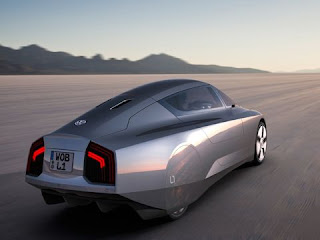Volkswagen plans to continue to improve hyper-efficient car capable of traveling 100 kilometers on one liter of fuel with L1 concept prepared for the year 2009 Frankfurt Auto Show. The first German car maker announces its intention to build a car "one-liter" in 2002, and with this latest iteration says the production version should be ready in 2013. Measuring the first European fuel efficiency is equivalent to 235 kilometers liter/100 mpg.
The L1 in its current form, however, does not quite hit that mark memorable. Volkswagen said a prototype capable of driving a car 100 miles on 1.49 liters of diesel or 158 mpg.
Power is provided by a 0.8-liter diesel engine and electric motor paired with a transmission speed dual-clutch seven. A lithium-ion batteries power supplies, while capturing regenerative braking energy when the car stops. In normal driving, the powertrain makes only 27 hp, but the amount increased to 52 hp when the sport mode is activated. Even in sports mode, the results of economic performance, with 0-62 mph takes 14.3 sec snail-like. Top speed is 99 mph.
To achieve such a high level of efficiency, Volkswagen engineers focused on the manufacture of L1, a light and aerodynamic as possible. skin made of carbon fiber body weight only 273 pounds, while the whole car weighs less than 850 pounds. The L1 takes the form of long and narrow slip through the air, where two passengers sit one behind the other and keep the overall height as low as a Lamborghini Murcielago. Drag has also been reduced by replacing the side mirrors with cameras and cover the entire underbody. Volkswagen claims the result is a very low drag coefficient of just .195.



